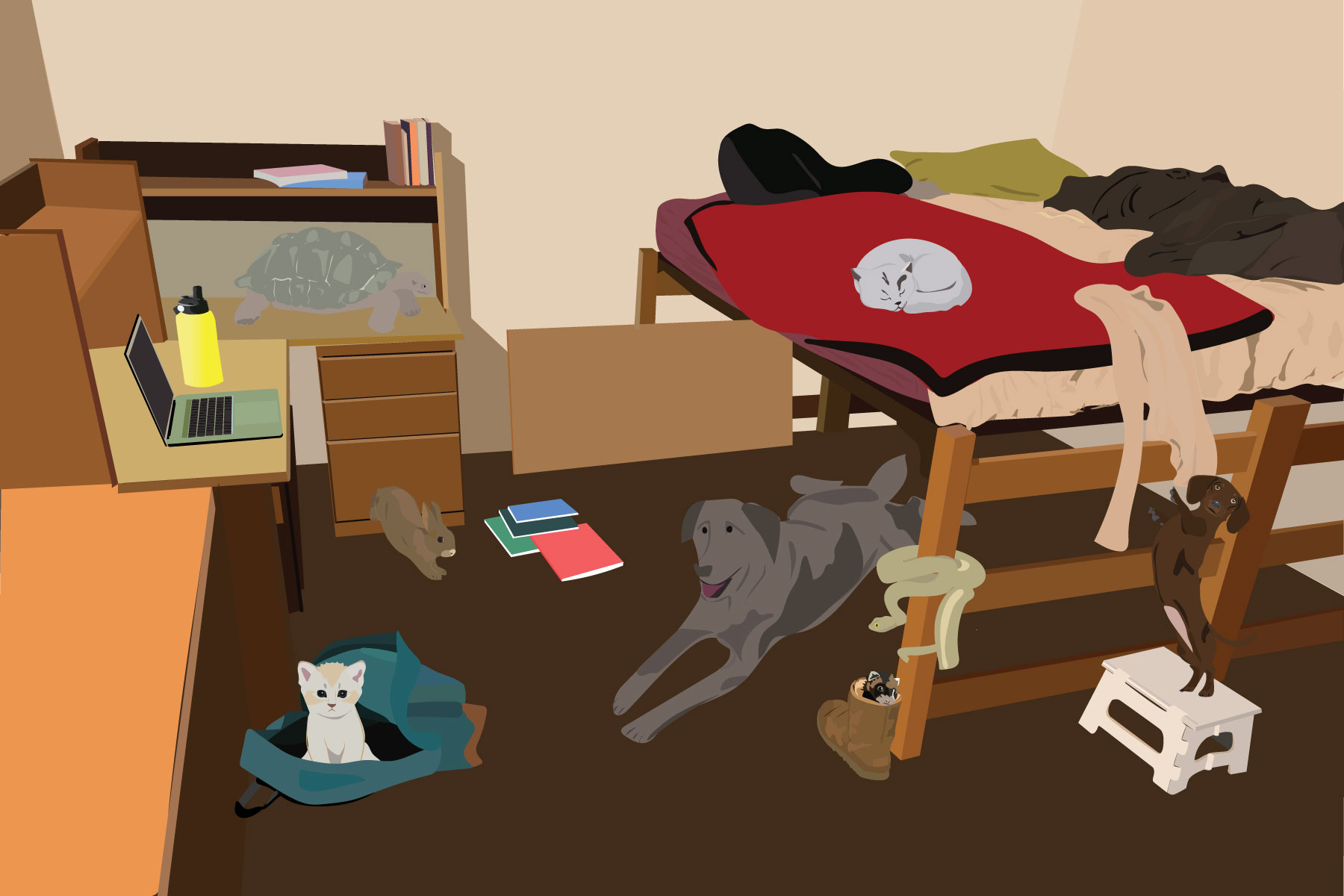College. A new zone to explore. And no higher power to hold you back from doing so. No parents nagging about safety. No teachers that watch you, beady-eyed, waiting for you to make a mistake. You are free to do as you please.
Perhaps this is the attitude that has resulted in college students acting the way they do. Cavorting about in that wild and reckless manner that they associate more with enjoyment than danger. Perhaps that is why college students go out of their way to do whatever they can, however small, to increase that adrenaline rush from doing something just slightly … illegal.
Like pets — when you’re not supposed to have them. Every college student will know of at least one fellow dormmate who has a furry friend secretly snooping around their room, kept out of the RA’s eyes to stay out of trouble. Heck, that person probably has some wild story of how their little friend got there in the first place.
“Oh, my friend just got this parrot on a whim and now I gotta keep him for the weekend.”
“Oh. This little guy. Yeah, we adopted him. But we don’t have permission to keep him here so don’t tell anyone.”
Of college students, 18% say that having a pet helps then handle the stress of college. Studies show that the reasons for college students owning pets range from just wanting to have a companion to getting through stressful situations. But even when they have these pets for these useful reasons, some college students tend to act as though it’s a novelty to be different from their hallmates for having a roommate that the RA’s don’t know about.
Does this hint at some different aspect of college student’s lives that causes this to happen? It probably goes back to the sense of independence these students face entering into a new dimension of their lives. First-year and second-year students are just testing the waters of what they can do without causing too much harm to themselves. The more adventurous they are, the more likely they are to get themselves into trouble. This can be where alcohol and drugs come into the picture.
Parents might warn their kids about partaking in these activities. Or try to get them to be at least partially safe while doing it. But what most people don’t think about is the smaller things. The things these growing adults do that seem harmless but could lead to a whole world of pain.
Like illegal pets. One might think, “What’s the worst that can happen if I have a little dog in my room?” They would not consider having the hallway smell because the dog decided to relive themselves in front of someone’s door — everyday. Or what might happen if there is a fire alarm, and the student is out of the building. They choose to look more at the best-case scenario, while the worst is stewing in the shadows, waiting to show itself.
This attitude of not worrying too much about the negative side-effects of one’s actions extends to all parts of a college students’ life. People might have heard of fellow students leaving their doors unlocked under the false presumption that “no one’s gonna come in,” not thinking that it would be very easy for someone to enter and steal something or do something worse. They leave shower lockers unlocked thinking “what is someone gonna do with my shampoo bottle?” not considering the random passerby who just to happens to be in a prankster mood. Or they might leave their laptop and books on a library table, thinking it is safe because students are bound by a code of conduct.
There are loads of examples of this carefree attitude of college students when one thinks about it. The result of the “freshman plague” is probably poor hygiene habits from trying to settle into a new space students have just entered in. And they don’t worry too much about it. A mass of people living in close contact with each other with this concept of personal hygiene lurking in the background is a recipe for disaster. Or what about the so called “freshman 15” where first-year students somehow gain 15 pounds in the few months they have been on campus? Again, this could be students settling in, not knowing where to go to get food. Or just being too lazy to find the gym. There is no one there to tell them what to do. So, the notion that “it will be fine” perpetuates.
It is these small things that college students do that are perhaps the most dangerous. According to data collected by the National Center for Education Statistics in 2016, the largest number of crimes that occurred on college campuses was burglary. And if you think about these little actions performed by college students, they probably facilitated these burglaries in some way or the other — whether they want it to happen or not.
So why does this way of living continue to be what it is for this group of individuals? Whether it’s owning illegal pets or something else, just because that little action causes an adrenaline rush, does it mean it’s worth it?
For the most part, probably not. But it might help students learn from the experience. A stick of experience is worth more than a forest of advice after all. That doesn’t mean one shouldn’t try to stick to following a few basic rules to maintain a safe atmosphere to have fun in.
Danger might lead to fun. But fun doesn’t and shouldn’t lead to danger.

















